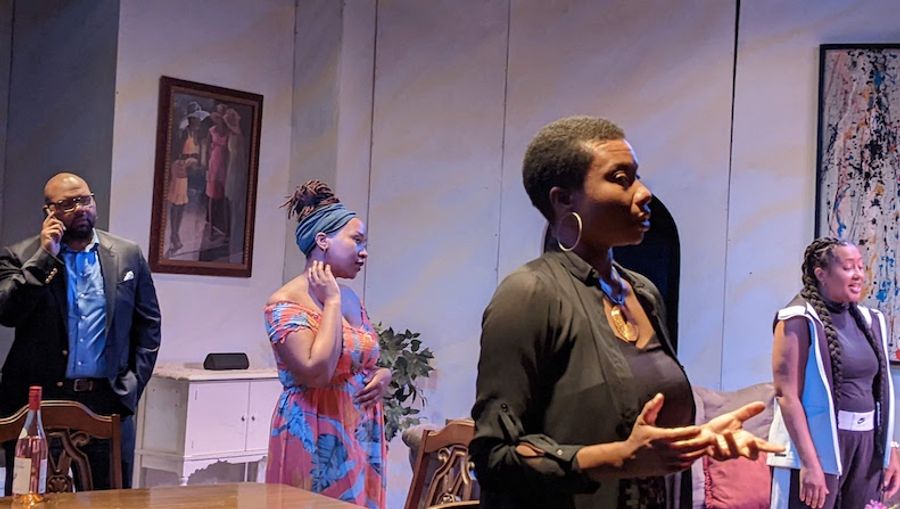The Detroit Repertory Theatre, founded in 1957, is a theatre that knows who it is, even if outsiders often don’t. The oldest alternative professional theatre in Michigan, with a budget of roughly half a million dollars, it is deeply committed to its Detroit neighborhood, to diverse casting, and to developing audiences that truly reflect its community.
But is it a theatre of color? The new artistic and managing director, Leah Smith, who took over from the founders on July 1, 2021, after working with the company for 20 years, and who is white, points out that over the years, Detroit Rep has defied easy definitions. She cited Bruce Millan, the former artistic director and one of the theatre’s co-founders, also white, who would often say, “The Blacks called us white, and the whites called us Black.”
Smith insisted that the theatre is neither one nor the other, and that this has been the case since they started moving away from the touring children’s theatre they were in the late ’50s into doing theatre for more mature audiences in the 1960s. Long before it was popular, let alone widely practiced, they did what was then called race- and gender-blind casting (practices that have since gone by other names, i.e. multicultural, “non-traditional,” or color-conscious casting).
“Especially back then, the media did not know what to do with us,” Smith said. “Everybody wants to categorize everything. Everything’s got to be separation and segregation and thinking in terms of lines and divisions.”
In 2020, Detroit Rep participated in a study released in partnership by the Wallace Foundation and SMU DataArts called “The Alchemy of High Performing Arts Organizations, Part II: A Spotlight on Organizations of Color,” co-authored by SMU DataArts Director Zannie Voss, Ph.D., and SMU DataArts Research Director Glenn Voss, Ph.D. As part of the second phase of the study, researchers looked at 21 organizations which “self-identify as primarily serving Black, Indigenous, Hispanic/Latinx, Arab American or Asian American communities through mission-related work.” Detroit Rep was included as part of this group despite the complexity of defining the type of organization they are.
The study led to a model of how these high-performing organizations link strategy with financial sustainability to succeed in the long term. One of the findings was that organizations in this group succeed not through a flash of success, but rather over a long slow burn. For Detroit Rep, that burn has been 70 years in the making.
Like others in the study, they have grappled with external moderating factors that include disaster/crises, local population changes, racism, and a limited access to funding.
Since its beginnings in the 1950s, Detroit Rep leaders have made sure that the staff, artists, and audience reflected the neighborhood where the theatre is located, which has long been diverse in many ways. Two of the co-founders, Millan and Barbara Busby, lived across the street from the theatre, and have been members of the Detroit neighborhood and the community for more than 60 years. During the riots of 1967, neighbors sought protection at the theatre when the tanks came rolling down Woodrow Wilson St., where the theatre sits.
“We had just moved into this building,” Smith recalled. “Everybody in the neighborhood, including ourselves, was freaked out. The neighbors around here came for two purposes—both to protect the Detroit Rep and also to shelter themselves. That was our relationship.”

The board has always been predominantly African American, sometimes 100 percent so. The audience has been predominantly African American, and the actors onstage have always been at least 50 percent African American.
“What we’re trying to say is that there is the reality of the world—which is systemically racist and misogynist,” Smith said. “These systems are based on lines and definitions and classifications. We are, with our art, trying to acknowledge that racism does exist, to acknowledge that those systems exist, while also saying, here’s an example of how we can live without it.”
Still, while Detroit Rep has been a leader in diversity and inclusion in Michigan for years, Smith admitted this hasn’t translated into funding from granters or major corporations. Instead their funding has almost always come from grassroots organizers and donors who give small amounts.
The exception was in the 1980s, when the Kresge Foundation gave them a grant to renovate the theatre and build a new parking lot, and again in the 1990s when another Kresge grant helped them execute a $250,000 renovation and expansion program to expand and refurbish the theatre, increase the seating capacity to 194, expand the parking lot, and build a new guard shanty.
Otherwise, fundraising has been a struggle, with some granting organizations explaining that they only fund large organizations or ones located in downtown Detroit. The Rep has committed to staying in its Detroit neighborhood, surrounded by blocks of residential homes, rather than moving to downtown, where greater investments are being made, or to the suburbs where many organizations and businesses fled after the riots. Smith said that they are also unable to do some of the things that funders demand.
“They want to see the real data analytics, statistics and numbers,” Smith said. “You can tell a story, but it doesn’t have the same weight as the data numbers they want to see, which takes technology and staff to do right.”
Indeed, at a theatre where all the administrative staff take on other tasks, including acting, directing, stage managing, and cleaning, data analysis falls by the wayside. The Alchemy report cited this kind of snag in organizational capacity—not having enough staff to do all the things needed to secure funding or create high-quality programming—as a common obstacle faced by smaller theatres, and a source of ongoing concern about staff burnout. Smith said there were times in the past that the founders worked without pay, something she conceded isn’t sustainable going forward.

The study reported that organizations serving communities of color didn’t rely on a single moment of success, but an overall strategy. Detroit Rep reported similar patterns of this crucial alchemy between high-quality programming and community organization. They are also among those for whom, in the study’s words, “environmental factors such as racism, gentrification, lack of access to institutional funding, and the crisis of COVID-19, and racial unrest challenge an organization’s ability to achieve short-term gains.” Funders who designate money explicitly for theatres of color find that Detroit Rep doesn’t fit the usual definition. Paradoxically, Smith said the theatre has faced blatant racism from media over the decades, garnering coverage that views the theatre more as a community service organization than as place where great theatre is made, simply due to its location.
“Every single review feels the need to talk about the state of the neighborhood,” Smith said, noting that during a recent cleaning of the offices she’d had the chance to read decades of newspaper clippings. “They paint this horror story: You drive down these dark, unlit roads with houses falling down around you, and then they get to this glorious paragraph where they say they open the doors to the lobby and it’s elegant and you’re transported back in time and your mouth drops.” She’s witnessed this pattern herself: “We can all see it the first time somebody walks in the door, and they see the candles, they smell the cookies, they see the bar and they feel the family energy.” That’s gratifying, she said, but it’s notable that this narrative is “in every single review.”
In the relative absence of large funding commitments, then, Detroit Rep relies on small and local donations. In 1999, they started a drive asking people to pledge $1 a week. Smith joked that other arts organizations wonder why they spend so much energy asking everyone for $52, but she said it’s worked for them: That drive has raised almost $2 million since its beginning. Of course, they also welcome bigger benefactors: A wall of “diamond donors” recognizes people who have given $1,000 or more with a bronze plaque in the lobby and yearly tags marking when they give repeated donations.
Similarly, Smith said the theatre’s outreach programs are geared to organizations that aren’t on anyone else’s radar. They do charitable group fundraisers by partnering with churches, sororities, block clubs, fraternities, and politically active nonprofits.
“We give them a big chunk of tickets that they can sell at their own price,” Smith said. “They’re kind of like a bridge—they bring in a whole bunch of people who may have never heard of the Detroit Repertory Theatre, but want to support their cause. They come in and we build relationships.” It’s the sort of thing the Alchemy report said successful organizations of color did well: forming deeper relationships with their community and showing the discipline necessary for financial stability.
Smith counted herself optimistic about the future. With the founders having retired after 65 years, she has surrounded herself with people she considers generous, talented, and exceptional.
“Everybody’s on the mission to move us from Detroit’s best-kept secret or Detroit’s hidden gem to not be hidden anymore and not a secret,” Smith said.
Bridgette M. Redman (she/her) writes about theatre and the arts for publications around the country. Her work has recently appeared in Encore Monthly, OnStage blog, and the Chicago Reader. She’s been a theatre critic since 2005.
Creative credits for production photo: Fairview by Jackie Sibblies Drury, directed by Will Bryson.


